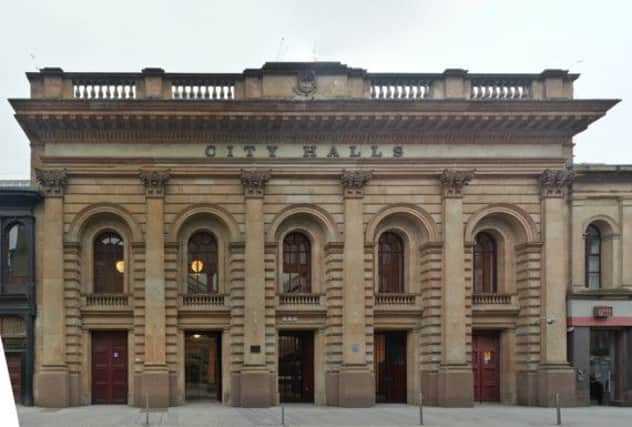Ken Walton: Volkov plans to move audiences with Tectonics


We can call it annual, because plans and commissions are already in place for 2015 and 2016. That was the advance news founder and co-curator Ilan Volkov – also principal guest conductor of the BBC SSO – imparted when we spoke last month.
What made that conversation all the more interesting was its location. I met Volkov in the glass-walled, geometrical splendour of the recently built Harpa Hall in Reykjavik, which itself was the chief inspiration behind the whole Tectonics phenomenon, an event that is now effectively an international franchise.
Advertisement
Hide AdFor while we may recognise the brand name from last year’s inaugural Glasgow Festival, it began life in Iceland, where Volkov is chief conductor and musical director of the Iceland Symphony Orchestra. Since the last Glasgow event he has adapted Tectonics for Adelaide and Israel, and shortly after this year’s Glasgow event he takes it to New York.
The clue to its origin is in the name, as I found on my visit to last month’s festival in Iceland. You only have to travel an hour out of the capital to Thingvellir National Park to view the spectacular landscape created by the European and North American tectonic plates gradually pulling apart to create a sort of miniature Nordic version of the Grand Canyon.
“I thought it would be great to do a new music festival that would have something to do with the culture here, and would have some kind of Icelandic name,” he explains. “This was just after the bank crash here, so things were bashing against each other anyway.” Tectonics, as a name, with its seismic connotations, seemed to fit the musical bill.
The Harpa Hall proved the perfect canvas for the idea Volkov had that the venue itself should act as a multi-functional sound board for the festival. As we spoke under the sparkling glass ceiling of the state-of-the-art foyer, sonic installations on one level were vying with multi-space performances by youth ensembles spread around the ground floor and on the staircases.
In the 1,500-seater main Elsborg auditorium, with its wedding cake tiers of red birch balconies and moveable acoustic panels, the Icelandic Symphony Orchestra performed music with clear geological associations – Cathy Milliken’s visceral Earth Plays, and Diamonds by a composer whose presence in Glasgow last year was monumental, 82-year-old Alvin Lucier.
Indeed, the key to Volkov’s Tectonics festivals is to build them around a specific venue and involve local composers and artists, including Scots music events producer Alan Campbell who, as Glasgow co-curator, is Volkov’s man on the ground.
Advertisement
Hide AdSo next week’s Glasgow programme, while it imports such international figures as American experimentalist Christian Wolff, Japanese mixed-media artist Takehisa Kosugi and Austrian Klauss Lang, also features new works by Scots-born James Clapperton and versatile Glasgow-based experimentalist and guitarist Richard Youngs, who will perform his first orchestral work – Past Fragments of Distant Confrontation – with the BBC SSO in the Old Fruitmarket.
Eighty-year-old Wolff’s inclusion is significant, given his links with the 1960s American experimentalism of John Cage and Morton Feldman, whose philosophies themselves lie at the heart of Volkov’s interests and enthusiasms. “His work has been described as the folk music of outer space,” says Volkov. “It is strange, it’s not easy listening, and much more difficult than Lucier or Cage.”
Advertisement
Hide AdAs with last year, the foyer and the recital room of the City Halls will house weird and wonderful installations, such as Sarah Kenchington’s “retrospective of musical instrument inventions” Down on the Farmyard, which people can actually play as part of “an ongoing collaborative soundscape”. Live performances flit between the main auditorium and the Old Fruitmarket, though there’s one exception to the single venue concept, with Friday’s opening orchestral concert taking place in St Andrew’s in the Square.
Is it possible to find perceptible themes in a tantalisingly busy and varied three-day programme? One obvious cluster of activity relates to an emphasis on vocal music, in particular the presence of leading UK vocal ensemble Exaudi, performing under its director John Weeks, who has written a special promenade piece, Radical Road, named after the track around Salisbury Crags in Edinburgh that was laid by unemployed weavers, and which will be performed, along with Glasgow University Chapel Choir and Glasgow Chamber Choir, on the stairs and foyer areas of the City Halls.
Local all-female septet Muscles of Joy are in, as are Edinburgh-based improvisers Usurper; and there’s experimental music project Cindytalk, who open a late-night gig on Saturday which also features Sonic Youth frontman and guitarist Thurston Moore and so-called “experimental noise-maker” Dylan Nyoukis.
And what is there in the Glasgow programme that is getting Volkov most excited? “Kosugi is a highlight for me,” he says. “He’s like a legend. He doesn’t really know what sounds are going to come out of his wired-up creations, but he gets really excited when they do. There’s an element of chaos in what he does. It’s often difficult to understand, but at the same time it’s so exciting to experience.”
Which sums up the sense of challenge, discovery and thrill I experienced at Iceland’s Tectonics festival – something which looks set to be repeated in a Glasgow context this coming weekend. If nothing else, expect the earth to move.
• Tectonics Glasgow runs from 9-11 May at the City Halls, Old Fruitmarket and St Andrews in the Square, www.tectonicsfestival.com